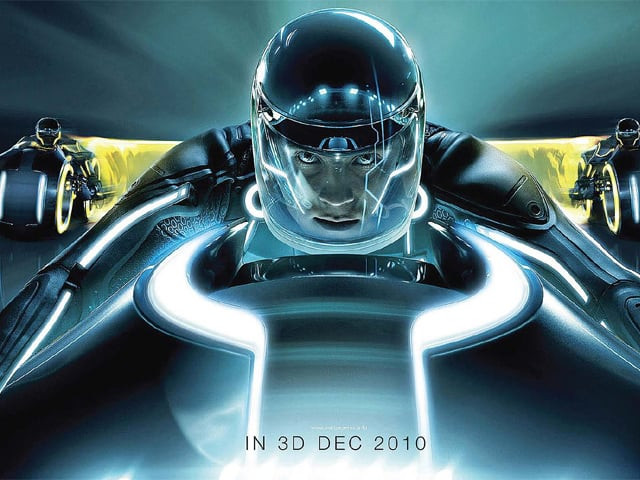Tron Legacy 3D: Behind the times
With something like Tron Legacy 3D, the wow factor just isn’t enough to mask a shoddy script and a boring story.

Disney’s 1982 version of Tron was upstaged by Spielberg’s genuine classic ET, released the same year. Yet there are people who grew up lauding the film for being ahead of its time in terms of exploring ideas about gaming and alternate realities. Sure, while the film may not have achieved the kind of technologically slick visuals that it wanted to, it more than made up for that failure by promoting an interesting idea.
Can a follow up to such a film be any good? What if top of the line CGI and 3D equipment was added to the mix? With something like Tron Legacy 3D, the wow factor just isn’t enough to mask a shoddy script and a boring story. It’s a bit of a one trick pony, this 3D business; once the techie cool attached to racing 3D neon stripes and glowing deathly Frisbees has faded, Tron Legacy brings little to the screen it’s desperately trying to jump out from.
Jeff Bridges plays Kevin Flynn, the man behind the Tron video game. He vanishes into cyberspace at the peak of his career to a world where Flynn is the Creator — white designer beard, Zen robes and all. He lives in a mansion of digital glass, chrome and light with a young protégé, Quorra, played by Olivia Wilde. He has been trapped there by the very alter ago he created all those years ago — Clu, a waxy Madame Tassaud’s version of Jeff Bridges who only wants perfection. Oddly, Clu’s idea of perfection is killing off the magnificent digital anomalies that Flynn thinks can help create ‘bio-digital jazz, man’ (yes, Flynn is some sort of post-hippy tech geek).
Like all nefarious villians eager to dominate the world, Clu wants very much to break through to the other side, to inhabit and eventually control real life. He bides his time by having various programs combat each other in a giant post-modern gladiatorial gaming arena, glowing with neon lights. Flynn’s son Sam stumbles into the virtual reality of his father’s making and finds himself thrown into the
gaming arena he is familiar with as a ‘user’. Clu is ecstatic to meet his creator’s son (he just can’t show his emotions because of his waxy face, so he tells Sam this), and things are thrown into mind-numbingly dull action with Clu trying to take over the real world and Flynn trying to save it.
There’s the gracefully ageing tech-hippy Jeff Bridges, and the waxy evil young Jeff Bridges, and neither of them is very interesting. There’s Sam, the bright young rebel who will find love, save the world and run his father’s mega-company for the good of mankind, and more money. And there’s his potential love interest Quorra, who may have something important under the surface, and while it’s nice to see “House’s” Thirteen again, it’s hard to suspend disbelief long enough to consider the possibilities of a relationship between a man and a computer program. None of these characters are strong enough to turn the film’s banal dialogue and repetitive glowing 3D action into a memorable cinematic experience. Here’s a tip: take off your 3D glasses during the 2D scenes, and see just how much brighter the picture quality is. And while you’re at it, see just how little is going on in Tron Legacy.
Published in The Express Tribune, January 9th, 2011.



















COMMENTS
Comments are moderated and generally will be posted if they are on-topic and not abusive.
For more information, please see our Comments FAQ